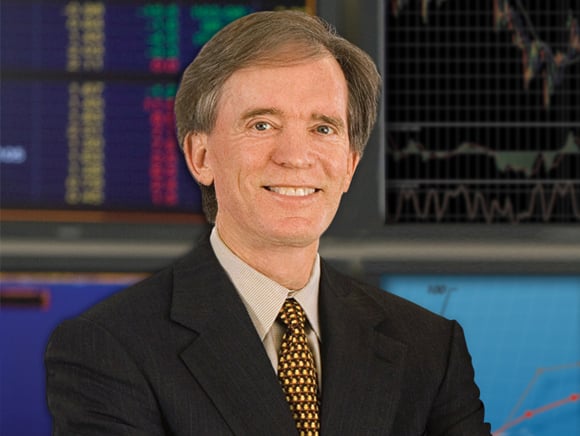Pacific Investment Management Co.'s Bill Gross, manager of the world's biggest bond fund, said the Federal Reserve is unlikely to do a third round of quantitative easing even with the economy adding fewer jobs than forecast.
Central bankers are likely to “extend the extended period” language for longer in their policy statements, Gross said in a radio interview on “Bloomberg Surveillance” with Tom Keene. The less-than-projected pace of jobs growth in May that the Labor Department reported today shows that “there is a persistency here. It's back to our old new normal,” he said.
U.S. employers in May added the fewest workers in eight months and unemployment unexpectedly rose to 9.1 percent, underscoring the concern of policy makers that the expansion is failing to boost the labor market. The Fed began the second round of asset purchases, known as QE2, on Nov. 12 after buying $1.7 trillion in securities through last year, increasing the amount of money in circulation to spur growth and prevent deflation. The Fed's $600 billion in purchases of Treasuries are due to end this month.
“We don't see a QE3. There has been too much discussion and dissent within the Fed to permit that type of program,” Gross said in the interview from Pimco's headquarters in Newport Beach, California. Given the current pace of growth and inflation “they will speak to a fed funds rate that persists for an extended period of time, which in effect caps interest rates in the process.”
Not Buying Treasuries
The Fed has kept its target rate for overnight lending between banks at a record low range of zero to 0.25 percent since December 2008.
Gross reiterated that he isn't buying Treasuries for his $243 billion Total Return Fund even as the government bond market rallies because yields are too low once inflation is taken into consideration. Mortgages, corporate bonds and sovereign debt of other nations are more attractive, he said.
Treasuries have returned 2.7 percent this year as Gross reduced government and related debt in the Total Return Fund to minus 4 percent of assets as of April 30. The fund has returned 0.57 percent in the past month, lagging behind the performance of 74 percent of its competitors, according to data compiled by Bloomberg.
Governments such as the U.S. are intentionally keeping interest rates lower than they should be to help reduce record debt levels, setting up investors up for a “skunking, or pocket picking,” Gross said.
Stock Picks
Investors could seek higher real returns than those now offered from government debt through investing in shares of “conservative” companies such as Procter & Gamble Co., Merck & Co. or those of utilities, according to Gross.
“The Treasury market up to seven or eight years is negative in terms of real interest rates, and that's not a positive for savers,” Gross said. “But if they took that money and invested it in a conservative stock, such as a Proctor or a Merck or a utility yielding 4 percent; then that's 3.5 to 4 percent real yield in comparison to those negative real yields in the Treasury side. So you have to take a little bit of a chance in order to avoid getting your pocket picked here.”
An overdependence on debt has the global economy in a period of fundamental transformation that Pimco has termed the “new normal.” Gross, the founder and co-chief investment officer of Pimco, forecast last year that mounting deficits and tighter financial regulation will damp growth in the U.S. and the euro zone.
Yields Decline
Payrolls increased by a less-than-projected 54,000 last month, after a revised 232,000 gain in April that was smaller than initially estimated, Labor Department figures showed today. The median forecast in a Bloomberg News survey called for payrolls to rise 165,000. The jobless rate climbed to the highest level this year from 9 percent a month earlier.
The yield on the 10-year Treasury note dropped three basis points, or 0.03 percentage point, to 3 percent at 1:31 p.m. in New York, according to Bloomberg Bond Trader prices. The 3.125 percent security due in May 2021 rose 8/32, or $2.50 per $1,000 face amount, to 101 1/32.
The Total Return Fund can have a negative position by using derivatives or futures or by shorting. Shorting is borrowing and selling an asset in anticipation of making a profit by buying it back after its price has fallen.
The fund has returned 8.23 percent in the past year, beating 77 percent of its peers, according to data compiled by Bloomberg. Gross, the founder and co-chief investment officer at Pimco, has averaged returns of 8.75 percent on average over the past five years, topping 98 percent of his competition.
Pimco, a unit of the Munich-based insurer Allianz SE, managed $1.28 trillion of assets as of March 31.
--Bloomberg News--







